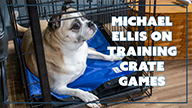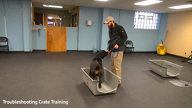House Training Mistakes Dog Owners Make with Their Dog

Troubleshooting Housetraining Problems with Your Dog
One of the most common themes in the many emails I get everyday concern problems people have with housetraining their dogs. I wrote a 165-page e-book titled Common Sense Solutions to Housetraining Problems. This is a thorough housetraining guide that complements my How to Housebreak a Puppy or Older Dog article.
When housetraining goes well, new pet owners assume that this is a cakewalk and it should be like this all the time. These people are wrong. More often than not, problems come up and when that happens, people get frustrated.
The fact is there are many reasons that puppies and older dogs develop housetraining problems. There is no silver bullet that is going to fix each and every dog's problem. With this said, the solution to all housetraining problems lies in owner education.
Before owners can solve their dog's problem, they must first have a clear picture of the correct way to housetrain a dog. I have written an article, How to Housebreak a Puppy or Older Dog.
The purpose of this article is to help pull a lot of information from my website together so dog owners can develop a game plan for solving their own housetraining problems.
When problems arise, pet owners almost always often fall into a common trap. They start to ask family and friends what they can do to fix these housetraining problems. Unfortunately, most people are unqualified and lack the experience to offer accurate advice. This results in a lot of bad information being passed out which only makes the problems worse.
Here are some of the most common housetraining problems areas:
- Puppies usually can't hold it for 8 hours until they are 16 weeks old. With this said, some have problems until they are 6 to 7 months old, while others are good at 8 weeks. Usually, dogs on an all-natural diet do better because they poop about 5 times less than commercial kibble eaters.
- You have to use a dog crate. If you're not prepared to do this, quit reading and move on because you are wasting your time. You are not going to reinvent the wheel by doing this without a crate.
- In the beginning, take your dog out often. The concept is to teach the dog that "if it holds it just a little longer, you are going to take it outside".
- The way we housetrain a dog in our home (both puppies and adults) is explained in detail in the article I wrote titled The Groundwork to Becoming a Pack Leader.
- It takes a dog about 5 seconds to pee. This translates into a simple rule which is "NEVER TAKE YOUR EYES OFF YOUR DOG - not even for 5 seconds".
- Those "pee pads" that pet stores sell are the dumbest idea I have ever heard. They teach dogs to pee and poop in the house.
- We don't let our dogs have free time in the house until they are 2 to 3 years old. If a dog has an accident in the house, they go right back to square one, and you have to start the housebreaking process all over again. Some dogs cannot be housetrained to the extent that they can be left alone inside the house (out of the crate) when you are gone.
- People let their dog out into a fenced in yard or on a tie out and don't actually watch their dog go potty, they just assume it happens when the dog is put outside.
- Your dog is experiencing a medical problem that is affecting their ability to control their bladder or bowels.
Solutions
- When a new puppy or dog enters your home, take them out every hour on the hour until they go pee and poop.
- Always take the dog outside after sleeping and eating. Do NOT play inside - this leads to a lot of accidents.
- Teach your dog how to potty on leash.
- Actually watch your dog go potty, and document their schedule.
- Keep your dog/puppy on leash in the house at all times during early stages of training.
- Use a crate or ex-pen to manage your dog when you can't or don't want to keep them on leash. (You have to be strict and structured in the beginning if you ever want to give them freedom later. Freedom is a privilege to be earned.)
- Use a real grass pad instead of other pee pads to teach the dog to prefer real grass (great option for city living situations)
- Always remember to make going potty outside more fun and rewarding than inside. Do not play inside, especially with puppies, as the excitement and physical activity tend to lead to potty elimination. Always play with your puppy after a potty break instead of before.
- Keep in mind the expectations you are setting for your puppy or new dog. It only takes a few repetitions of a behavior for it to become a habit.
- If you are still having trouble with potty accidents in the house consult a vet and rule out any potential medical causes like a bladder infection.
If you have a dog that's between 8 weeks and 16 weeks of age, I strongly recommend that you get my DVD titled Your Puppy 8 Weeks to 8 Months.
If your dog is 4 to 5 months old, I recommend my DVD titled Basic Dog Obedience. Obedience training is one of the steps in teaching our dogs what are the "RIGHT" and "WRONG" things to do in life. The fact is if you as a pet owner find yourself with a housetraining problem, you have more to learn than your dog. My articles, Q&A's, and webboard can help you through this process.
Here are some additional articles that I recommend to all pet owners:
- Common Sense Solutions to Housetraining Problems
- How To Housebreak A Puppy or Older Dog
- Ed Frawley's Philosophy of Dog Training
- The Power of Training Dogs with Markers (Clickers)
- Training Puppies Not to Bite
Please don't email me with specific problems. I assure you that if you read what I have written and study my work, you will not only find your answer, but you will also become a better dog trainer along the way. You can search our Q&A's for housebreaking problems that Cindy and I have addressed. (Make sure to select Q&A's in the sidebar to filter results.)
I hope this information helps provide some direction for you and your dog.









Ask Cindy.